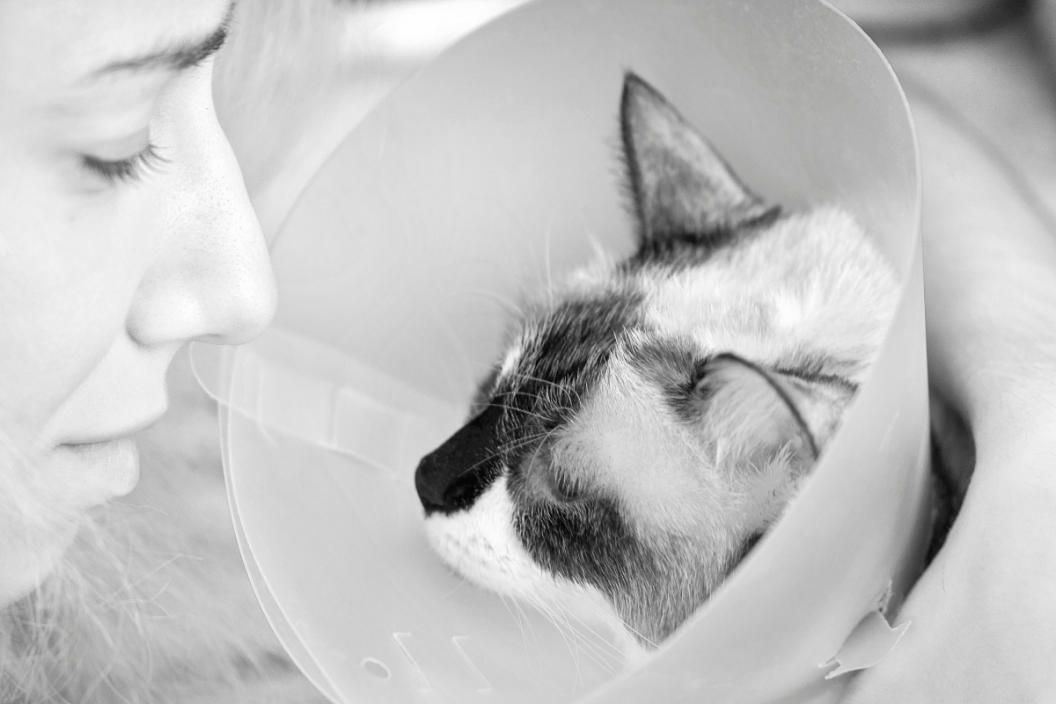Your pet was diagnosed with cancer. Now what?
For pet owners, getting a cancer diagnosis for their dog or cat can be a hard piece of news to swallow. Many questions immediately race through your mind, from what type of cancer they have to what kind of cancer treatment is available. Of course, as you look at treatment options, you wonder what their quality of life will be like. Most of these questions can be answered by your vet or veterinary oncologist. The oncologist will help you decide how to treat your pet's cancer while answering all of your questions. Here's a look at what to do when your pet is diagnosed with cancer from signs through treatment.
Signs Of Cancer In Dogs & Cats
Even if your pet is getting regular veterinary care, health problems can sneak up on you, especially as your pet ages. There are a few warning signs that will begin to appear before you actually get a cancer diagnosis. Some signs to look out for are:
- Weight loss
- Bleeding from any opening
- Bad smelling breath
- Swelling
- Sores or cuts not healing
- No appetite
- Grey or white gums
- Lameness
- Hard time breathing
- Constipation or diarrhea
If your pet is exhibiting any of these signs, take them to the vet. Your vet will run tests, including bloodwork and a physical exam. Your vet can also refer you to an oncology specialist for more detailed treatment options for your pet.
Types Of Pet Cancer
Although nearly 300K men (roughly 1 in every 8) develop prostate cancer each year in North America, with 1/41 passing, over 12M cats and dogs are developing about 75 types of cancer, with approx. 1/2 senior dogs dying of cancer. Pets are family and we must do more. 2/4
— The Pet Cancer Foundation (@PetCancerFdn) November 1, 2021
RELATED: Avoiding Disease: How to Safely Remove Ticks from Your Pet
There are many different types of cancer that your pet can have, but some are more common than others. Some of the more common forms of cancer are:
- Mast cell tumors
- Lymphoma
- ?Melanoma
- Bladder cancer
- Bone cancer (Osteosarcoma)
- Hemangiosarcoma
- Liver cancer
- Breast cancer
- Carcinoma's
Your vet will run a series of blood tests, X-rays, and exams to determine the best course of treatment for your pet. For example, if your pet has a nodule or a tumor, the vet will likely do a biopsy to see if it contains cancer cells. Some other ways to test tumors are to do a radiograph, tissue aspirate, bone marrow test, and urinalysis.
The next steps will likely involve diving deeper into veterinary oncology and speaking with a specialist to learn more about your pet's diagnosis and get a better understanding of your options.
Cancer Treatment Options
When your pet is diagnosed with cancer, you can get a referral to a veterinary oncologist who will go over treatment options with you that take into account the type of cancer and your pet's well-being. According to Blue Pearl Vets, the treatment plan for canine cancer is often very similar to treating cancer in humans. Like humans, the best treatment option will depend on their type of cancer and how far it has progressed.
If your pet has cancer in their lymph nodes or bloodstream, it is likely that cancer has metastasized or spread throughout their system, and there may be little you can do to improve your pet's quality of life. Soft tissue sarcomas are also known to metastasize and spread.
According to OncoLink, some additional treatment options are the following:
- Surgery
- Radiation therapy
- Chemotherapy
- Immunotherapy
Some pets may need only one type of therapy, while others will need a combination of two or more therapies to treat their cancer. Ask as many questions as you want of your vet so that you have a full understanding of their needs and your options. Ultimately, treatment focuses on helping your beloved pet feel comfortable and reducing pain. Vets will try to prolong their life as long as their quality of life does not suffer, which is why treatment options are typically less aggressive than when doctors treat cancer in humans. Still, your pet may suffer side effects from their treatment like loss of appetite, tiredness, and more.
Sometimes the discussion with your vet leads to end-of-life care and discussing when euthanasia is the best possible option.
Cost of Cancer Treatment
https://twitter.com/wearethecure/status/1417576330644934662
????Cancer treatment can be quite costly, but there are some options to help you treat your pet to the best healthcare possible. Some veterinarians offer financing through their offices, while many accept CareCredit.
You can also reach out to friends, family, and strangers through crowdsourcing like GoFundMe. In addition, some pet organizations also offer assistance for treatment. For example, the Best Friends Animal Society has a comprehensive list of resources by state and cancer type.
Pet Cancer Support Groups
It is hard to go through cancer treatment with your pet. However, many support groups will help you cope with the inevitable feelings of uncertainty, fear, and grief that will arise. PetCloud offers counselors to speak to and plenty of other resources for pet owners to lean on during this difficult time. When your pet is diagnosed with cancer, often talking to the vet is not enough, and it's hard if friends and family have not gone through what you are experiencing.
For those who lose their pets to cancer, there is also an online grief support group to talk through your feelings with those in the same place you are.
Has your pet been diagnosed with cancer? Tell us over on our Wide Open Pets Facebook page.




